Over wide areas of the urban first world, the Panopticon State is already very much a reality. Folks like us, the contributors to Samizdata.net, White Rose and the grizzled veterans over at Privacy International cry out warning pretty much daily alerting people not so much about the simple fact of surveillance per se but rather surveillance plus data-pooling.
Yet it is important to draw people attention to the basic facts and encourage them to notice the evidence right in front of their eyes, peering down at them like menacing mechanical crows perched on metal branches jutting from walls everywhere, that we are increasing under surveillance by the state directly…

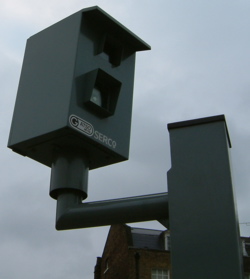
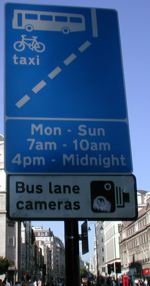
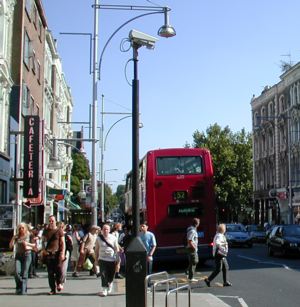
…and by companies whose surveillance footage states are increasingly reserving themselves the right to gain access to on demand…
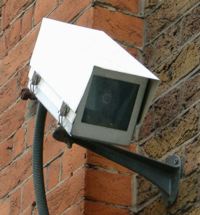
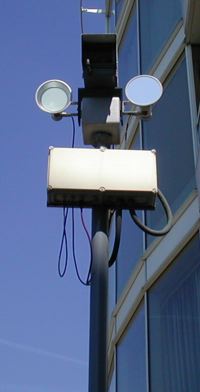
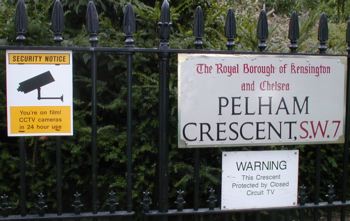
But the people who would like our every move recorded and subject to analysis are not fools. They would rather you did not actually notice what is before your very eyes and so we are seeing the second age of CCTV: more aesthetically pleasing and less intrusive cameras, rather than the stark utilitarian carrion crows which currently predominate…
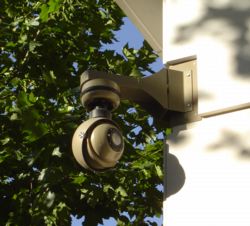
…rounder, blending in with the background…
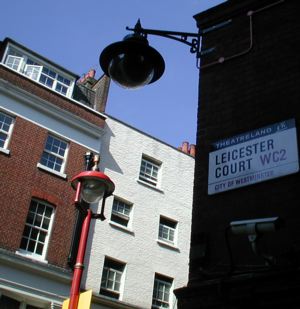
…looking more like the lighting fixtures than the all-seeing-eye.
The second age of security cameras is at hand…still quite literally staring you in the face, but increasingly hiding in plain sight, counting on a mixture of clever design and the fact that familiarity breeds contempt. But Big Brother is still watching, only with a little more style and taste now. That just makes it more dangerous.

(Cross-posted from White Rose)




The more the merrier then. All the harder to actually use them for anything remotely resembling oppression.
With criminals being nastier and more numerous than ever, the police evidently having decided that crime prevention is not their job, and the courts proceeding is if an incarcerated criminals reflect poorly on civilized Britain — one wonders what approach to civil order is promoted by the sages at Samizdata.
I doubt I count as a Samizdata sage, but permitting people to exercise their personal right to defend themselves with firearms, not wasting prison space and the lives of nonviolent offenders by putting them in prison, and redirecting the police towards acting aginst violent crime and not drug offenses would be a start.
I’m a bit confused by Dave’s comment. Surely the more, the easier, no?
Is anyone demanding that we, the general public, get access to all CCTV footage in real time?
1] If the police have the right to see it, we certainly do. Ordinary citizens are superior to the police – they are our subordinates.
2] If everyone could see all footage, firms would be less keen to set up cameras, and the public would be less keen to allow them to operate.
Dave makes no sense at all.
Someone wrote that we’ve already reached the total computerized surveillance state. We have the storage capacity to save all the film we take while waiting for computer face recognition technology to catch up, so the govt will have a total record of your every movement from 2003-2013 once the technology is perfected in 2013 (10 years was just an arbitrary assumption on my part about how fact the technology will develop).
Dave makes the rather obvious point that if you are concerned about abuse of CCTVs (or any technology) then your best defence to ensure the technology is as many hands as possible.
An alternative strategy is to go around with a bag over your head, preferrably made of tinfoil which should produce nice image distorting reflections.
However, if your concern is that a record of certain facts is being retained, that can subsequently be used to make decisions, then you have as much credibility on the subject of making decisions based on the facts of the matter, as say trial lawyers.
Cams, as they are in England, don’t worry me.
Reason: no data pooling. More importantly, no reasonable possibility of data pooling. Think about it here. Any of you folks downloaded a movie off the ‘net? 700 megs for a 2 hour movie playing in a box the size of the palm of my hand. Consder the logistical complication of (a) collecting (b) storing (c) sifting the mountain of data that a city-full of cams create daily.
As a result, cams are useful for getting views of a particular event, but all-but-useless for generalized trawling (which is the real dictatorship threat).
The only cam-related tech that does worry me, is automated face recognition. That could enable trawling.
Well, , the privacy folks should take a look at Libertarianism and Privacy in the Age of Terror, a little ditty I wrote a while back. Among other things, it asserts that a surveillance state may be necessary.
Since I wrote it, another benefit of such came to mind: protecting people from false convictions. Many individuals are convicted on eye-witness testimony, despite that fact that it is notoriously unreliable. The more cameras arouind, the more proof of who really did the crime!
Julian: “More importantly, no reasonable possibility of data pooling. “
No reasonable possibility…today.
I’ll concede that pooling all of the CCTV feeds for a city would (probably) be prohibitively expensive and difficult with current technology – but 10 years from now? Today, processor speeds are doubling every 12-18 months and hard drive capacity is doing it every 9 months or so. Even if those rates turn out to be unsustainable in the long run, the price of the existing technology will continue to decrease sharply. At some point in the future, government is going to decide that those trends have finally lowered the cost of pooling camera feeds to a level it’s willing to swallow. I really wouldn’t be surprised if that point has already been reached.
“How often, or on what system, the Thought Police plugged in on any individual wire was guesswork. It was even conceivable that they watched everybody all the time. But at any rate they could plug in your wire whenever they wanted to. You had to live – did live, from habit that became instinct – in the assumption that every sound you made was overheard, and, except in darkness, every movement scrutinised.”
P2 in my edition. I think some people here are alarmingly complacent about generalised surveillance. I don’t like being spied upon – full stop.
Phil, what’s surveillance like in Sigapore?*
To be honest, I think the majority of people wpould welcome a total surveillance society. It would make them feel safe, so long as the machinery were discrete and elegant. “It makes you feel safe, innit?”
*I hear they’ve just legalised table dancing. Congrats!
10 years is a long time, especially nowadays. Time is working in our favor, far more than it is theirs. Cams, wars, erosion of consitutions (written or un-) and so forth leave me unworried. This is not complacency, it’s targetting of attention: mere circumstances are transient and mutable. The real war is for minds, and for control of the zeitgeist. We’re gradually but surely winning that one, and the new tech is maing it ever easier.
“Those willing to give up a little liberty for a little security deserve neither security nor liberty” (Franklin)
Oft quoted, maybe even clichéd but it sums up my feelings on CCTV everywhere.
The 1984 passage says it all. You don’t have to be watched all the time – it’s just knowing that it is possible that you may be at any particular time that makes you behave as if you are.
That’s how surveillance works – get the subject to believe they are being watched… Or at least unable to tell when they aren’t.
You could not be more wrong about the threat Julian. Data pooling just requires mandated data retention with access to the data on demand. The owner of the cam is forced to bear the cost of keeping the data. The Regulation of Investigative Powers Act has put 100% of the powers needed in place for all that. To use that data, all the authorities have to do is know where you live as a starting point and just order access to the CCTV records they need to watch what you do when they want. The possibility of political abuse given that there has already been an attempt to give R.I.P Act powers to such ‘essential agencies’ as the Health Service, Fire Departments and Local Authorities, is pretty damn obvious.
John Moore on his linked blog article says ‘the advent of terrorists with WMD are the reason that ‘we’ will have to accept a panopticon state, regardless of the fact there no and never have been terrorists with weapons of mass destruction. Sept 11 was done via a hack… it use US civil airliners and box cutters, not WMD. This is a measure of the background of hysteria and confused thinking that privacy advocates must confront as loudly as possible.
Phil, what’s surveillance like in Singapore?*
CCTVs are rare here (as in SE Asia as a whole), but then labor is cheap and there are lots of ‘security guards’.
BTW, what Julian call ‘data pooling’ is technically and economically feasible today. You don’t transfer the image, you abstract close to source and then transfer some data representing the matching criteria.
And as Julian points out, it is very difficult to propose any cogent argument against making facts available – the point of my rather sarcastic comment about trial lawyers.
So lets say you are a ‘trouble maker’… someone like me, for example. Sometimes you go out of your way to force the local planning authorities justify every single decision they make as laid out by law but rarely in reality observed, and thus you are loathed by the local Gauleiters in the local town hall… and maybe it is a ‘fact’ that you are a married man who happens to repeatedly visit the house of a woman to whom you are not married, where her husband is not home, and all this is caught on CCTV.
These are facts, no doubt about it.
And lets say that the RIP Act is finally extended to local authorities, as they recently tried to do and will no doubt try again, allowing low level public ‘servants’ to go on ‘fishing expeditions’ to see what he people they dislike are getting up to. Do you really think that will not happen?
And knowing that they can do that, do you not see the chilling effect it will have? Just like the Orwell quote earlier, the fact they might be watching is enough. They do not have to actually get the footage of my every movement, I just have to know that if i piss off the wrong people, that could happen to me. We all have secrets. Chances are I will just decide to stop being a trouble makers and let the people in the town hall do what they like. Is that really a fantastical scenario I am positing?
If you are not afraid, you have no imagination. And a lack of imagination is not a pro-survival trait.
It appears to me that the main purpose of all these cameras, is not the prevention of terroism, or of any other sort of social misbehaviour. Terrorists and criminals are not deterred by the thought of someone possibly watching them, terrorists may even wish to be seen – the bigger the audience, the bigger the terror.
Their main purpose is for controlling motorists, whether for parking, speeding or any other offence that police can think of, consider a mugging seen and recorded on camera. If seen in real time, the police take so long to get up from their desks, that the perpetrator would be long gone, if used in replay mode to identify the miscreant, the likelihood of anything positive being derived is very small, (see the Lawrence murder of a few years back), and would the police really be that interested anyway?. If they cannot be bothered to investigate burglaries, why bother with muggings or any other form of street crime?.
The mindset of policing in the UK today is to only pursue the easy, profitable target, and they dont come any easier than ‘the motorist’. If a substantial fine is involved, then it is “Hello constable”, if a real crime such as mugging, burglary or rape, or any other crime against a member of the public is commited, anything where only a short prison term or probation is the penalty, then you are on your own, and ‘We are taking appointments for next week’, is the standard police reply. You can rate the ‘clean-up and speed of results’ rate by the amount of cash that is in it for the police. The more cash the faster the action.
I am amazed at the easy acceptance of the plausible Govt. excuses, by the Commenters above, yes, it may be difficult to propose a cogent argument against the collection and revelation of facts collected by camera, but that doesn’t make their use on such a scale right. It is overkill and can only have a negative effect on our quality of life.
It would seem to go directly against the principal that no one can be forced or coerced into incriminating themselves. By the acceptance of cameras that is exactly what we are being asked (forced), into doing.
Perry, I’m not sure if that whole piece was by John Moore or partly yours… but – Regarding terrorists with WMD – what about the nuclear and biological warfare material found in Georgia ? http://www.cdi.org/russia/262-12.cfm possible dirty bomb It looked very like it was heading towards terrorists.
As to your other post – and being afraid of Town Hall et all – surely the problem really lies with the Totalitarians of Town Hall- not with the spy cameras … In complaining about the cameras you are using exactly the same argument that they use against guns… that “people other than myself cannot be trusted to use them- therefore guns(cameras) themselves are BAD and must not be allowed to be used in public” – but this argument breaks down because cameras are neither good nor bad (that depends on the usage) and there are the obvious anti criminal benefits of the spy cameras. People like them because they feel safer with them about (as in the UK we aren’t allowed to protect ourselves anymore this is hardly surprising). The problem is really one of how to keep Town Hall politicos from becoming a law unto themselves. The important thing is to ensure that the cameras are used in our favour.
Phil covers most of my view.
Other people covered the rest. The more images recorded, the less and less chance of them being used for any practical purpose.
Short of fully functional artificial intelligences, some decades away yet, you might be able to get some stuff after the fact but as a tool for government opression, there are better ones.
As for the idea that people modify their behaviour because they are watched. Apart from speed cameras, do you really notice them on the street?
Dave: Not true. All you need is a start time to give you an idea of time frame and finding a section of footage is really quite simple. As more systems become digital, the process gets easier still. You do not have to wade through thousands of hours of footage to find what you want.
Joe: That is a false analogue bacause I regard the nature of the modern state as the intrinsic problem, the cameras are just a means by which that problem manifests itself.
I am not against surveillance per se (as I say in the article), I am against the fact employees of the state can just access that surveillance as and when it wants on a trivial basis. If there was a SERIOUS burden, such as having to get a court order each and every time, I would have somewhat less of a problem. Likewise if there were no data retention requirement I would be rather more relaxed. That is not the case.
I just want to repeat that we should be seeking access for all to all CCTV images and databanks. The idea that the police and other ‘officials’ can scan them with face-recognition software and ordinary citizens cannot is a repulsive thought.
If we can be chilled by the mere thought of being watched, then police officers, tax inspectors etc should all be having the same worries. We have far more right to pry into their movements than they into ours.
It is also hard for us to campaign for the removal of cameras, but much easier for us to campaign for us all to have equal rights to access any cameras and databanks at any time. We could even use the “law-abiding officials have nothing to fear argument”.
A thought: Orwell’s chilling ‘1984’ passage, cited by Tony H, failed to anticipate infra-red thermal night vision. Thought Police now could watch your every movement in the dark also, once the price of infra-red imaging falls enough.
And as Scott says and some others overlook – the databank of today can be built up for another decade or two while the controllers wait for retrospective face-recognition scanning to become practical once that software gets cheap and quick enough.
Perry,
Not true. All you need is a start time to give you an idea of time frame and finding a section of footage is really quite simple. As more systems become digital, the process gets easier still. You do not have to wade through thousands of hours of footage to find what you want.
Actually, the more there is the harder the process becomes. There is a small thing called “storage” and “indexing” which, for digitial is, I can assure you, far from “simple”.
This also presupposes you know the timeframe and the location, easy if, say, a child has been abducted from a supermarket around 4pm on Friday the 12th.
But much harder if you want to use this stuff to track individuals moving randomly around a city, or, for that matter, find out where various people were at various times. The problem is, that sort of survelience does not scale well.
I have no problem with this kind of activity per se, but I do agree that you need transparency.
The data retention issue will, over time, solve itself. Either you degrade the bandwidth to solve the issue, which means the information can be next to useless for legal purposes, or you end up with increasingly expensive and impossible to index sensibly storeage solutions.
So you are not against surveillance, well I am. where will the limits be drawn?, are we to have cameras in public bathrooms?, dont laugh, there are laws regulating and allowing sex in public toilets, why not have a camera to keep a check on things?. There are no limits for ‘the Enemy’, they will go to any extreme to establish and maintain control.
Your easy acceptance of constant surveillance in public places is very surprising, the minor niggles you voice about data being available only with a warrant, and over the length of time such records may be kept, are really trivialities when compared to the main question of having cameras and surveillamce in the first place. It seems that you have accepted them as a ‘done deal’, and as such we have to accept them.
This twenty-four spying does nothing to improve our safety or quality of life, it is all about control…and really is unnescessary.
So you dont mind being watched, are you hoping ‘they’ will see you behaving yourself and award you Brownie points for good behaviour, if not so, then I am amazed at your easy acceptance
Junior,
where will the limits be drawn
What limits?
The more cameras the harder it is to do anything with it.
You mention cameras in public toilets. You expect that the law enforcement agencies have the resources to look at all the feeds, then identify all the people and do something about it? Not going to happen. At least, not this side of working AI and we’re a pretty long way off that.
This twenty-four spying does nothing to improve our safety
A rape was prevented in the UK last week by an observant officer getting concerned about a young woman being trailed along a deserted road by a man. The patrol car arrived as the man tried to pull her off the road.
I’m not claiming it does all that much for our safety but there are excellent crime detection uses for them.
There are a few in the town centre where I live, I don’t really think about them all that much, the only time cameras modify my behaviour is that I slow down through the speed traps.
Perry, “Joe: That is a false analogue bacause I regard the nature of the modern state as the intrinsic problem, the cameras are just a means by which that problem manifests itself.”
By throwing up the manifestation of cameras as being a problem – I think it detracts from the real problem- which is in fact the unwelcome agendas of those who wield political powers. The anti-criminal benefits of the cameras which are now regularly seen on television programs can make someone who complains about the cameras look like a bit of a weirdo and the real problem of the Insidious Political agendas then tends to get overlooked or dismissed as the ramblings of the “weirdo”!
Joe,
The anti-criminal benefits of the cameras which are now regularly seen on television programs can make someone who complains about the cameras look like a bit of a weirdo
All part of the spin and propaganda, get us to accept a little bit less freedom, a piece at a time. At the same time call anyone who thinks differently a ‘weirdo’.
Just read elswhere on the Web about a ‘black box’ for vehicles to restrict speed etc. originally in the Guardian.
(http://observer.guardian.co.uk/uk_news/story/0,6903,1011463,00.html).
How long before we are all tagged and labelled at birth with some type of eletronic device. Will the Media still be shouting ‘weirdo’, at any objectors?. The technology is here and ready to use.
I reiterate – it is all about population control, not personal safety, not about anti-terrorist measures, and it is certainly not for our benefit….
How did we all manage ten or twenty years ago?, the population is not that much bigger now, and surveillance cameras were then the ‘weirdo’ idea. Since that time, things have deteriorated, traffic is slower than at any time, and street crime is at the highest level in the civilised world. You still touting the anti-criminal effect of cameras?.
Another story elswhere of two guys filming in the street, being being persuaded to stop by the police on pain of arrest by the ‘anti terrorist squad’, and all that may entail, ‘nod, nod, wink, wink,’. All for filming without a permit. Big time criminals eh!. ,
I do not know the answers, but I know that the way things are going is very wrong. It’s uncomfortable and depressing..
Junior, Don’t let it get you down… grab it with both hands and enjoy it- go out and buy a miniature camera in a pair of glasses – like on “Mission Impossible” and then go secretly film EVERYWHERE you go!!! 🙂
The spin and propaganda is more of the problem… To remove the cameras requires the passing of “NEW LAWS” … it wouldn’t do anything to free us from the spin and propaganda and you could bet that once we have been banned from using the camera’s more “NEW LAWS” would quickly pop up to get the camera’s back for use by the government alone- for “our benefit” of course!
Far better to tackle the issue of spin and propaganda as a Major Item – and let the camera issue work itself out. The camera’s now exist – making the concept of cameras disappear is a false hope… like trying to wish nuclear bombs away! Its here – now we have to accept responsibility for it and make sure that acceptable use becomes part of everyones personal ideology… with the law only coming into play when real crimes are committed.
Dear Perry & Readers
This may come as a shock………
The output / content from many of the remote cameras in the UK will be available for purchase by you and I as browsable content on mobile phones within 30 months.
There are already initiatives well under way in this regard. Some of which I’m involved in. OOOOER…..How sinister!
The revenues will inevitably pay for the rest of the country to be “camera’d up”.
Once the country is completely wired we will effectively have another stealth tax by the state praying on Joe Public’s love affair with voyeurism.
Just thought you may be interested!
Kindest regards
Simon
The output / content from many of the remote cameras in the UK will be available for purchase by you and I as browsable content on mobile phones within 30 months.
Cool! How long before someone charged with an offense is released because they can prove they were somewhere else or the facts of the matter were different to those alleged?
The content is actually far more useful on a PC, but I understand why it is launched on MPhones = pay-for-use revenue model.
Perry’s characterization of my thesis as “hysteria and confused thinking” screams for a response.”
The real confused thinking is indicated by his statement: “regardless of the fact there no and never have been terrorists with weapons of mass destruction…. Perry should ponder a closely following sentence in the article: “This new era means our premises about society and government are now suspect.
His incorrect assertion is a weak substitute for reasoned discussion of the issue. Even were his assertion to be true, it would entirely miss the point.
To destroy his argument, it is only necessary to point out that before 9-11, there had never been terrorists who had crashed larger airliners into tall buildings either. Should we always wait until the enemy uses a weapon once before defending with it? Hardly!
The realization that the Bush administration and many in the defense business achieved after 9-11 was that the terrorism/WMD threat was real. 9-11 did NOT demonstrate that terrorists had WMD’s; rather, it destroyed the reigning official opinion that terrorists would avoid causing mass casualties because it would defeat their politicl goals. THAT was confused thinking – becaused it generalized a particular experience of terrorism and applied it to all possible terrorism.
The important issue, as mentioned in my thesis, is this: ”
For the first time in the existence of man, small groups of terrorists or anonymous agents of a hostile government can unleash massive disasters.
And this is true. Terrorist now have demonstrated their willingness, while Iraq and North Korea have demonstrated that rogue states will create the method. North Korea has furthermore threatened to provide WMD’s to terrorists.
The attitude of those with current or near future access to the weapons is held not only by Bin Laden, but also by the former president and second highest cleric in Iran, another prospective nuclear rogue regime with a massive terrorist arm:
“If a day comes when the world of Islam is duly equipped with the arms Israel has in possession, the strategy of colonialism would face a stalemate because application of an atomic bomb would not leave any thing in Israel but the same thing would just produce damages in the Muslim world“. This statement is an only slightly disguised call for a nuclear attack against a nuclear armed state, because the retaliation would be “damages only” – just a few tens of millions of Muslims. THIS is the sort of danger that we face!
Furthermore, as a technical point, Terry is wrong in his assertion about terrorists never possessing weapons of mass destruction. He seems to have forgotten about the Anthrax attacks in the US shortly after 9-11. Anthrax is a WMD and was deployed in a terrorist attack. The amount used could have been much more effectively distributed, killing many more people.
So I would suggest that rather than making weak arguments against the likely inevitability of the surveillance state, Perry and others consider realistically what it means and how to deal with.
Hysteria and confusion is what happens AFTER the attack. Let your imagination go and consider the action in the US after most of the government and a hundred thousand others are suddenly killed in a nuclear attack on Washington, DC. Surveillance cameras? That’s a minor issue in comparison!
My article is an attempt to get people to think about it beforehand, because the attacks WILL happen, and in democracies, people will demand solutions. Would you rather be ready now to deal with their panicked solutions to a very reasonable security concern, or just ignore it until the problem hits?
Incidently, what discussion on terrorism would be complete without dragging out Ben Franklin’s quote. Copies seem to be hanging above the keyboards of an amazing number of people who engage in “slippery slope” thinking. The fact that Franklin himself advocated giving up of freedoms for security (in the founding of the US, granting significant powers to the government over its citizens) should tell you that his thinking was more subtle than the blunt application of his quote.
Finally, it matters little what the net privertarians say. When the terrorism gets worse, the people will DEMAND protection. Get ready for it!
One more comment…
As another poster mentioned, the important issue is not the existence of cameras, it is the attitude of the population and their government that makes the difference between tyranny and freedom! The government already has vast powers for oppression that it does not use!
Disclaimer: I am currently employed developing Digital Video Recorders for one of the largest manufacturers of CCTV equipment in the world. It means I’m something of a technical expert in the field. It also means I’m biased.
First, the state of technology:
My best prediction is that sometime between 2004Q3 and 2005Q2, a Las Vegas casino will go live on the world’s first Total Site Surveillance installation (TSS). TSS features video logging of all movement and interactions within the controlled facility. TSS will be able provide searchable archives of a specific person’s movements and interactions. It will support ad-hoc identification of groups of people. Example queries are along the lines of “How many times has this person been in my facility in the last 6 months?” and “Who has this person talked to on more than once, excluding facility staff?” All query results will include specific video segments.
The only technical challenge to TSS is that facial recognition has some difficulty in recognizing that a person has visited previously. In instances where it becomes important enough, operators will be able to correct difficulties through analysis of associates. TSS may need to be augmented with iris identification.
It is important to note that I am talking about a casino. Casinos are far and away the most lucrative market for CCTV equipment. They move quickly, and are willing to pay top dollar for bleeding-edge equipment. They are also very interested in protecting the privacy of their patrons from everyone but the casino. If people thought that taking a mistress to a casino would likely be used against them, they wouldn’t do it.
Some years ago, a friend of mine had a kid sleeping in his car, parked on the street. My friend was aware of the kid, and accepted the situation. That should have been the end of the story.
Unfortunately, the local PD drove by and noticed the kid sleeping there. They rousted him and beat him. As he was being beaten, he called out for someone to watch. The officers later lied about what had transpired, and the DA pressed charges of resisting arrest against the kid. The officers would have gotten away with it, except for one witness. The witness had indeed seen the event, and moved away (as planned) two weeks later. It took some work to track down the witness. The witness was credible because she had never had any interaction with either the kid or the two officers. In short, she had no reason to lie. That was the threshold for being a credible witness against the police.
Consider as counter-point, the televised beating of Rodney King, and various other events.
Video recording is actually a more potent weapon against the police and public figures because they care more than average about their image.
I believe it was Eugene Volokh who wrote a lengthy analysis of the majority opinion in Lawrence V. Texas. That decision was based on liberty rather than privacy. They are actually different. ‘1984’ somehow conflated the two. Smith had neither, so people equated the two. What got lost was that Big Brother had privacy. “How often, or on what system, the Thought Police plugged in on any individual wire was guesswork.” How effective would that surveillance be if people were watching Big Brother watch them? It breaks down very quickly if the lack of privacy is reciprocal. One public viewing of the Central Committee discussing switching alliances would likely break the whole system.
The way I see this being a good thing is if citizens at large have surveillance capabilities equal or greater than the police. Anything police can see without a search warrant needs to be publicly available. If the police, Illuminati or Hari Krishna want to be able to watch what’s happening on my street, that’s acceptable if I can watch the exact same thing with the exact same indexing capability. If we’re going to pay for installing these systems, make them open.
Dishman,
Excellent post and great ideas.
John
Reflecting further…
I don’t really care much what people think about me. I don’t much care who’s watching me. If someone has a problem with what I do, that’s their problem.
Perry’s example of a philanderer being blackmailed out of public participation doesn’t bother me. To my mind, secret philandering violates both halves of the Law of Thelema: “Do what thou wilt, but harm none”. Keeping a secret like that doesn’t exactly qualify as standing behind your actions, and it’s harmful to your spouse. You made a promise, and if you’re afraid of having it come out that you’ve broken that promise, you’ve got only yourself to blame. If, on the other hand, you stand behind that action, then by all means. That’s your choice. Don’t expect me to respect your cowardice, though.
Dishman’s comment on making CCTV an open system is very interesting… his indifference to seeing the use of politically motivated intimidation because his sensibilities are offended by a philander however are interesting for rather different reasons: everyone has secrets. Everyone. Many people are non-conformists and that makes them unpopular. Thus many non-conformists keep the nature of the non-conformity ‘low profile’… like homosexuals in many communities for example, or people of courting someone of a different race or religion in some areas. What Dishman is saying is that unless you are ‘out’ about everything, it is perfectly ok for people to use those true fact you would rather keep discreet against you.
Are you really so wise and Soloman-like that you can make that decision for other people? The advent of the Panopticon means the pressure to conform will be tremendous if secrets became almost impossible to keep.
I apologize for the disconnected nature of this post. Each paragraph is intended to be read individually. They don’t flow together well.
It seems to me that a philandering is hardly non-conformist. Saturday Night Live’s parody of the Reagan-Carter debate comes to mind, “… and you are looking lovely tonight, Madame Moderator”.
Indeed, I have no problem with philandering per se, so long as all three (or more) parties are aware of it.
What you have described is blackmail. It’s generally not acceptable practice. Those who engage in it tend to fare badly. Most minor political figures would tend to avoid it under the threat of MAD, if nothing else. Also, minor politicians can see that those with a higher profile are already subjected to a high degree of that already, and would doubtless like to avoid it.
Politically motivated intimidation already occurs. It has occurred since we first gathered into packs. It occurs in one form or another in most every pack species. Polar Bears (such close relatives) come to mind at this moment. Yes, it carried forward far enough it would lower the threshold greatly. I believe it would lower it far enough to make the playing field effectively level. The more political power you have, the higher your profile, the more eyes on you.
I don’t think the question of ‘outing’ everyone applies in this case. One of the side-effects of requiring that all video and indexing be publicly available is that politicians would likely feel restrained in their implementation of it. The requirement that indexing be public would force the broader question onto the table before such indexing could actually occur.
“The advent of the Panopticon means the pressure to conform will be tremendous if secrets became almost impossible to keep.” After mulling this over for an hour as I write, I believe there is a significant difference between how the two of us experience life. Most of the people I know have been called wierd at least a few times. Several of them actually played the stereotype and reveled in the attention they got. Maybe you’re referring to pressure to be a drone. Frankly, I’ve got no clue how that works (the pressure, or being a drone).
Just popped in to have a read of the comments today and something weird has happened…
I wrote a comment yesterday – but as “Junior’s” comment seemed to be totally in italics – I put think I put more Italics in to see if it would work or not… but my comment seems to have vanished and all the following comments are in ITALIC !
Is everyone seeing this or is it just on my computer?
yup I’m seeing the italics as well, which is making it a mite confusing. Hence I’ve added an extra close italics to this post.
…which obviously hasn’t made any difference.
Ah – its changed – if not you duncan – then someone else has fixed it.
Re Dishman’s posts… I think freedom to remain anonymous is in this this instance dependent on the public agreement of what is acceptable to film and what is not… and also on what allowable use can be made of the film.
There is definitely a question of intent… if the camera is placed with criminal (or malicious) intent then it should be illegal.
This should all be covered under privacy and data protection law.
My fault – I opened italics with , but then closed incorrectly with , which should have been
Apologies to all!..